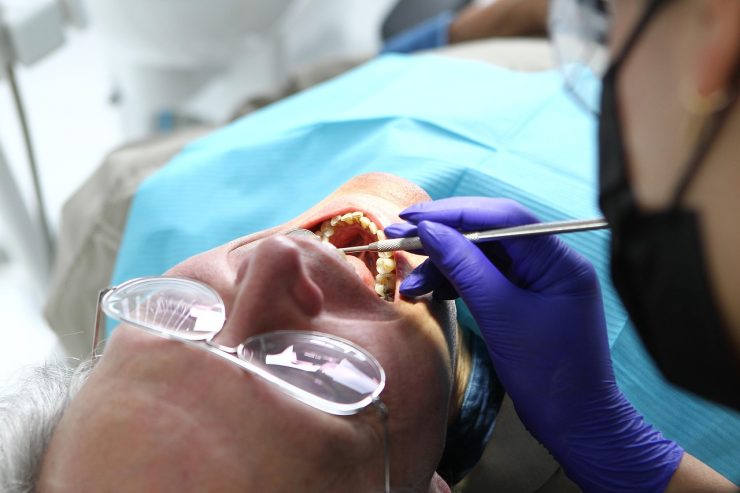It often comes as a surprise, but oral health plays a major role in overall health. Research continues to show just how closely the condition of teeth and gums is tied to serious health concerns like heart disease, diabetes, cancer, and even dementia. Taking care of the mouth isn’t just about a bright smile—it can help prevent life-shortening illnesses.
The Mouth Has Its Own Microbiome
Much has been said about the gut microbiome, but the digestive system actually starts in the mouth—and the mouth has a thriving microbiome of its own. It’s home to hundreds of species of bacteria, fungi, and other microorganisms. In a healthy oral environment, these microbes assist with digestion and help protect against harmful pathogens. They also play a role in preventing tooth decay and gum disease.
However, when oral care is neglected or the diet is poor, the balance shifts. Sugars and starches feed harmful bacteria, leading to plaque, cavities, tooth decay, and gum infections like gingivitis and periodontitis. These oral infections can travel through the bloodstream, affecting other systems in the body.
Despite the cultural focus on white, straight teeth, the reality of dental health in the U.S. tells a different story. Data from the National Health and Nutrition Examination Survey shows that 91% of adults have cavities. About one-third have untreated oral health issues, and nearly 65 million adults have some form of periodontal disease. Among adults 65 and older, the prevalence of tooth and gum problems jumps to 65%.
So, what’s driving the decline in oral health? Diet is a major factor. High sugar intake, processed carbohydrates, acidic sodas, and even high-carb vegan diets can damage teeth and gums. Some inflammatory conditions—like celiac disease, IBS, Crohn’s, and ulcerative colitis—can also impact oral health by reducing nutrient absorption or increasing inflammation.
The food and nutrients that are consumed don’t just affect the body as a whole—they also directly influence the condition of the mouth.
Health Problems Linked to Poor Oral Health
Heart Disease and Stroke
Bacteria from gum disease can enter the bloodstream, leading to inflammation, clots, and narrowed arteries. These changes raise the risk of hypertension, stroke, and heart conditions such as endocarditis, a potentially deadly infection of the heart lining.
Diabetes
People with diabetes are more prone to infections, including those in the gums. Gum disease can worsen blood sugar control, making diabetes harder to manage. In turn, chronically high blood sugar levels can fuel further gum damage—a cycle that’s tough to break without good oral care.
Erectile Dysfunction
There’s a surprising connection between oral health and ED. Inflammatory bacteria from gum disease can damage blood vessels and restrict circulation, including to the genitals, making it harder to achieve or maintain an erection.
Cancer
Ongoing inflammation and chronic infections from poor oral hygiene have been linked to increased risks for cancers of the pancreas, kidneys, and blood. Tobacco use adds even more risk, but evidence suggests that gum disease alone may raise cancer risk in non-smokers as well.
Respiratory Infections
Bacteria from the mouth can be inhaled into the lungs or spread through the blood, increasing the chances of pneumonia, bronchitis, and even COPD. A weakened immune response caused by oral infections makes fighting these conditions even harder.
Dementia
Inflammation from gum disease may affect brain health. Some studies have found links between oral infections and cognitive decline, memory loss, and even Alzheimer’s disease, likely due to the inflammatory compounds entering the brain via the bloodstream.
Other conditions connected to poor oral health include:
-
Rheumatoid arthritis
-
Infertility
-
Pregnancy complications
-
Kidney disease
-
Fibromyalgia
-
Asthma
-
Autoimmune disorders
Supporting Good Oral Health
Maintaining oral health starts with the basics: brushing twice a day, flossing daily, and visiting a dentist at least once a year. Professional cleanings help detect issues early and prevent more serious problems.
Diet plays a huge role. Diets high in sugar and processed carbs fuel harmful bacteria. On the other hand, low-carb or Paleo-style eating—rich in vegetables, healthy fats, and clean proteins—can significantly reduce the risk of dental issues.
A few key steps to support a healthy mouth and body:
-
Choose a nutrient-dense, anti-inflammatory diet
-
Cut back on sugar and refined carbs
-
Stay hydrated
-
Spend time in the sun to get vitamin D
-
Move daily
-
Manage stress
-
Get enough restorative sleep
In short, protecting oral health is just another part of caring for the body as a whole. Healthy habits benefit everything—from teeth and gums to the heart, brain, and immune system.











